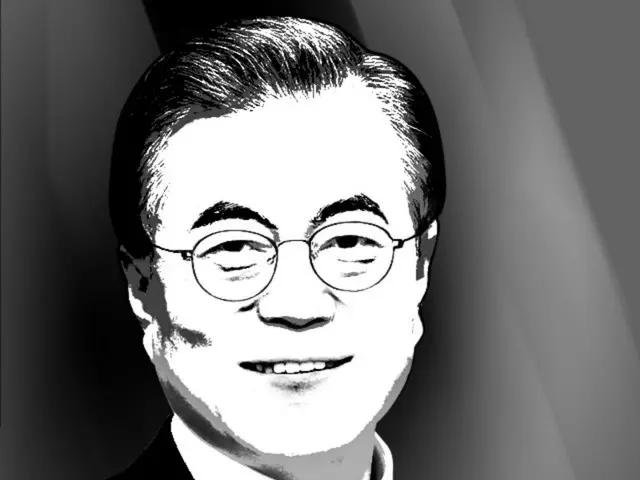He looked back on events that took place during his term in office, which ran from May 2017 to May 2022. He also touched on Japan-South Korea relations, pointing the finger of responsibility at Japan for the further deterioration of relations between the two countries during Moon's term in office.
During Moon's term in office, the Supreme Court of Korea ordered the defendant Japanese companies to pay compensation to the plaintiffs, the former forced laborers, in a lawsuit over former forced laborers.
Relations between the two countries have deteriorated to the point where they are said to be at their worst since the end of the war. In July 2019, the then Shinzo Abe administration implemented stricter export controls on three types of semiconductor materials to South Korea, and in August of the same year, it introduced preferential export controls.
The Cabinet decided to amend the Cabinet Order to exclude South Korea from the "Group A" to which the measure applies. At the time, South Korea criticized the Japanese government's move as a "discriminatory measure aimed at South Korea for political reasons related to the former forced labor ruling."
In response to the Japanese government's measures, South Korea notified Japan that it would terminate the General Security of Military Information Agreement (GSOMIA) in August of the same year. Moon wrote in his memoirs that he made this decision:
Looking back at that time, he said, "Because it was a very sensitive issue not only in terms of Korea-Japan relations but also among the three countries of Korea, the United States and Japan, I wanted to hear public opinion before making a final decision."
The memoir revealed the process leading up to the decision to scrap GSOMIA, but the South Korean newspaper JoongAng Ilbo said, "This
"There is a risk that this could be interpreted as meaning that important foreign and security policies were decided based on public opinion polls," he said. In May 2022, the administration changed and the Yoon Seok-yeol administration was born.
However, the Yoon administration, which has been working to improve Japan-Korea relations since its inauguration, announced a solution to the former forced laborers lawsuit issue in March last year. The content of the solution was to establish the Japan-Korea Forced Mobilization Victims Support Foundation, an organization under the Korean government that supports former forced laborers.
The "Japan-Korea Compensation Organization" would pay the plaintiffs the amount of compensation, including interest on delayed payments, on behalf of the Japanese companies that had been ordered to pay compensation to the former forced laborers. The announcement of this settlement led to a dramatic improvement in Japan-Korea relations.
However, Moon mentioned this solution in his memoirs: "The only solution Japan demanded was for South Korea to take responsibility. The Yoon administration accepted it. But that was nothing less than surrender.
He also criticized the Japanese government for denying the compulsory and illegal nature of the mobilization of former forced laborers as "uncivilized."
In his memoir, Moon criticized the then Abe administration's policy toward Korea, but in February last year, an interview with Abe was recorded in Japan.
The "Shinzo Abe Memoirs" was published, in which Abe points the blame for the breakdown in Japan-Korea relations at the Moon administration. Abe also mentioned the former forced labor lawsuit issue in his memoir. The Moon administration has
He pointed out that even though he knew that the decision was a violation of international law, he thought that he would use "anti-Japanese sentiment" as a means to boost his administration. "President Moon Jae-in was doing it with full knowledge of the situation."
Regarding the matter, the ministry explained that it took the measures in response to the Moon administration's failure to propose any solutions following the Supreme Court ruling, and stated, "There are two issues: the former forced labor issue and the flaws in the South Korean government's trade control system for security reasons."
"The government has made it seem as if the two issues (which are said to have a military presence) are linked, making South Korea take the forced labor issue seriously," he said.
In his memoir, Moon also criticized the decision to withdraw from the summit, calling it an "emotional countermeasure that drew strong pressure from the United States."
He revealed his exchange with Abe during the meeting. Abe is said to have proposed holding joint Japan-US-South Korea exercises on the Korean Peninsula and said that training should be conducted to evacuate Korean corporations to Japan.
Moon criticized Abe for "inciting fear" and said he "did not take into consideration at all" South Korea's position of prioritizing easing tensions.
The memoir, which was released on the 18th, is a response to questions from Choi Jong-gon, who served as first vice minister of the Ministry of Foreign Affairs in the Moon administration.
The book is written in the form of a response from the Prime Minister, with Moon looking back mainly on his diplomatic relations. In addition to Abe, it also includes exchanges with former U.S. President Donald Trump and North Korean leader Kim Jong Eun.
It is also written.
2024/05/21 13:19 KST
Copyrights(C)wowkorea.jp 2

